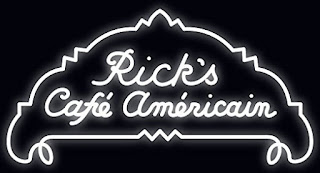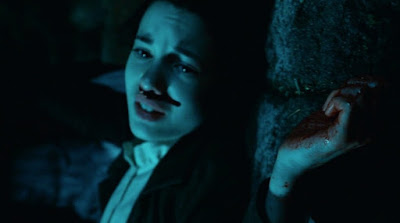Film Scene Analysis - 'Casablanca' (Introduction to Rick's Cafe Americain & Rick)
The film 'Casablanca' was directed by Michael Curtiz (https://en.wikipedia.org/wiki/Michael_Curtiz) and produced by Hal B. Wallis (https://en.wikipedia.org/wiki/Hal_B._Wallis), the film itself has been revered by any contemporary Film directors as being a masterpiece that truly stands out against almost all other films produced during its time. What makes 'Casablanca especially unique is the message of inspiration and change that is embodied by the French hero, Victor Lazlo and the tough but endearing act of Rick, the neutral American who is embodies America (as a country's) state in the war.
One scene in particular that stands out is the first time the audience sees the exterior and more importantly the interior of Rick's Cafe Americain (https://www.google.co.uk/search?q=ricks+cafe+americain&rlz=1C5CHFA_enGB767GB767&source=lnms&tbm=isch&sa=X&ved=0ahUKEwiDq8OhsZjXAhXFmBoKHUyqBbEQ_AUICigB&biw=1920&bih=1008), within the building the architecture greatly resembles that of the area it is based in, beautiful arabic arching doorways and strange yet detailed lamps that cast complex shadows, almost like dark paintings onto the surrounding walls, furniture and patrons of the cafe. What this scene does well (aside from creating a foreign yet homely atmosphere), is it introduces the hidden world at war, patrons secretly handing each other documents and organising a variety of ways of escaping the german controlled city of 'Casablanca', however whilst it does suggest that others find hope in the idea of escape, some see it as a curse, the idea that hope is almost entirely out of reach brings on disparity, this depression can be seen in a few of the cafe's patrons, seeming as though they could give up entirely should things continue the way they'e going.
 Following the first few shots of the cafe's interior we begin to hear the first reference to the cafe's owner, Rick; we learn from one of the waiters that Rick does not sit with any of his customers, the infers that Rick is a man who does not mess around and has reached a state of social standing where his word is law (to a point). This reference is interesting simply because we learn about Rick and his character even before we actually meet him, this sort of introduction continues right until we see his face. He is a stern character whose stare seems as though it silence a raging bull, in front of him is a chess board (with no one on the opposition) and a martini, this suggests that he is indeed masculine yet also very smart, however the fact that he is playing chess against himself infers that he might see others as inferior or at the very least, he doesn't believe that anyone else could present themselves to be much of an actual challenge. This sort of introduction is rare in the film industry however in 'Casablanca' it is remarkably well done, reminding us that a character doesn't have to be introduced by conventional means every time.
Following the first few shots of the cafe's interior we begin to hear the first reference to the cafe's owner, Rick; we learn from one of the waiters that Rick does not sit with any of his customers, the infers that Rick is a man who does not mess around and has reached a state of social standing where his word is law (to a point). This reference is interesting simply because we learn about Rick and his character even before we actually meet him, this sort of introduction continues right until we see his face. He is a stern character whose stare seems as though it silence a raging bull, in front of him is a chess board (with no one on the opposition) and a martini, this suggests that he is indeed masculine yet also very smart, however the fact that he is playing chess against himself infers that he might see others as inferior or at the very least, he doesn't believe that anyone else could present themselves to be much of an actual challenge. This sort of introduction is rare in the film industry however in 'Casablanca' it is remarkably well done, reminding us that a character doesn't have to be introduced by conventional means every time.
One scene in particular that stands out is the first time the audience sees the exterior and more importantly the interior of Rick's Cafe Americain (https://www.google.co.uk/search?q=ricks+cafe+americain&rlz=1C5CHFA_enGB767GB767&source=lnms&tbm=isch&sa=X&ved=0ahUKEwiDq8OhsZjXAhXFmBoKHUyqBbEQ_AUICigB&biw=1920&bih=1008), within the building the architecture greatly resembles that of the area it is based in, beautiful arabic arching doorways and strange yet detailed lamps that cast complex shadows, almost like dark paintings onto the surrounding walls, furniture and patrons of the cafe. What this scene does well (aside from creating a foreign yet homely atmosphere), is it introduces the hidden world at war, patrons secretly handing each other documents and organising a variety of ways of escaping the german controlled city of 'Casablanca', however whilst it does suggest that others find hope in the idea of escape, some see it as a curse, the idea that hope is almost entirely out of reach brings on disparity, this depression can be seen in a few of the cafe's patrons, seeming as though they could give up entirely should things continue the way they'e going.
 Following the first few shots of the cafe's interior we begin to hear the first reference to the cafe's owner, Rick; we learn from one of the waiters that Rick does not sit with any of his customers, the infers that Rick is a man who does not mess around and has reached a state of social standing where his word is law (to a point). This reference is interesting simply because we learn about Rick and his character even before we actually meet him, this sort of introduction continues right until we see his face. He is a stern character whose stare seems as though it silence a raging bull, in front of him is a chess board (with no one on the opposition) and a martini, this suggests that he is indeed masculine yet also very smart, however the fact that he is playing chess against himself infers that he might see others as inferior or at the very least, he doesn't believe that anyone else could present themselves to be much of an actual challenge. This sort of introduction is rare in the film industry however in 'Casablanca' it is remarkably well done, reminding us that a character doesn't have to be introduced by conventional means every time.
Following the first few shots of the cafe's interior we begin to hear the first reference to the cafe's owner, Rick; we learn from one of the waiters that Rick does not sit with any of his customers, the infers that Rick is a man who does not mess around and has reached a state of social standing where his word is law (to a point). This reference is interesting simply because we learn about Rick and his character even before we actually meet him, this sort of introduction continues right until we see his face. He is a stern character whose stare seems as though it silence a raging bull, in front of him is a chess board (with no one on the opposition) and a martini, this suggests that he is indeed masculine yet also very smart, however the fact that he is playing chess against himself infers that he might see others as inferior or at the very least, he doesn't believe that anyone else could present themselves to be much of an actual challenge. This sort of introduction is rare in the film industry however in 'Casablanca' it is remarkably well done, reminding us that a character doesn't have to be introduced by conventional means every time.



Comments
Post a Comment